2014SH听力测试真题
2014年全国高考英语听力卷试题、答案 听力原文
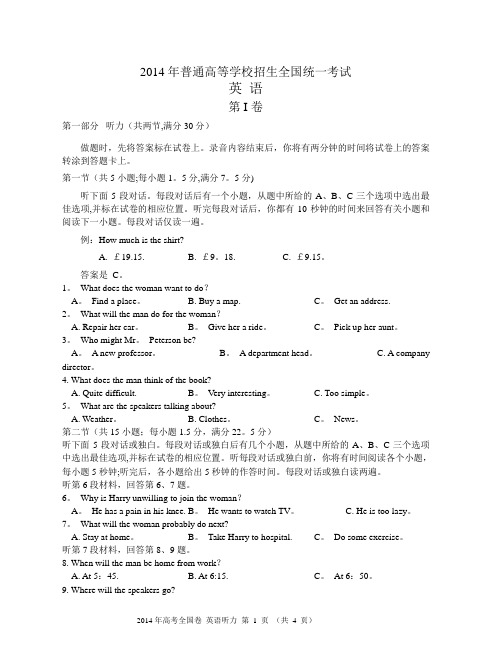
2014年普通高等学校招生全国统一考试英语第I卷第一部分听力(共两节,满分30分)做题时,先将答案标在试卷上。
录音内容结束后,你将有两分钟的时间将试卷上的答案转涂到答题卡上。
第一节(共5小题;每小题1。
5分,满分7。
5分)听下面5段对话。
每段对话后有一个小题,从题中所给的A、B、C三个选项中选出最佳选项,并标在试卷的相应位置。
听完每段对话后,你都有10秒钟的时间来回答有关小题和阅读下一小题。
每段对话仅读一遍。
例:How much is the shirt?A. £19.15.B. £9。
18.C. £9.15。
答案是C。
1。
What does the woman want to do?A。
Find a place。
B. Buy a map. C。
Get an address.2。
What will the man do for the woman?A. Repair her car。
B。
Give her a ride。
C。
Pick up her aunt。
3。
Who might Mr。
Peterson be?A。
A new professor。
B。
A department head。
C. A company director。
4. What does the man think of the book?A. Quite difficult. B。
Very interesting。
C. Too simple。
5。
What are the speakers talking about?A. Weather。
B. Clothes。
C。
News。
第二节(共15小题;每小题1.5分,满分22。
5分)听下面5段对话或独白。
每段对话或独白后有几个小题,从题中所给的A、B、C三个选项中选出最佳选项,并标在试卷的相应位置。
听每段对话或独白前,你将有时间阅读各个小题,每小题5秒钟;听完后,各小题给出5秒钟的作答时间。
2014年全国高考英语听力卷试题、答案 听力原文

2014年普通高等学校招生全国统一考试英语第I卷第一部分听力(共两节,满分30分)做题时,先将答案标在试卷上。
录音内容结束后,你将有两分钟的时间将试卷上的答案转涂到答题卡上。
第一节(共5小题;每小题1。
5分,满分7。
5分)听下面5段对话。
每段对话后有一个小题,从题中所给的A、B、C三个选项中选出最佳选项,并标在试卷的相应位置。
听完每段对话后,你都有10秒钟的时间来回答有关小题和阅读下一小题。
每段对话仅读一遍。
例:How much is the shirt?A。
£19。
15。
B. £9.18。
C. £9.15。
答案是C。
1。
What does the woman want to do?A. Find a place。
B。
Buy a map. C。
Get an address。
2。
What will the man do for the woman?A。
Repair her car。
B. Give her a ride. C。
Pick up her aunt。
3. Who might Mr. Peterson be?A。
A new professor。
B。
A department head。
C。
A company director.4。
What does the man think of the book?A。
Quite difficult. B。
Very interesting. C。
Too simple.5. What are the speakers talking about?A。
Weather。
B. Clothes. C。
News。
第二节(共15小题;每小题1。
5分,满分22.5分)听下面5段对话或独白。
每段对话或独白后有几个小题,从题中所给的A、B、C三个选项中选出最佳选项,并标在试卷的相应位置。
听每段对话或独白前,你将有时间阅读各个小题,每小题5秒钟;听完后,各小题给出5秒钟的作答时间。
2014年全国高考英语听力卷试题、答案 听力原文
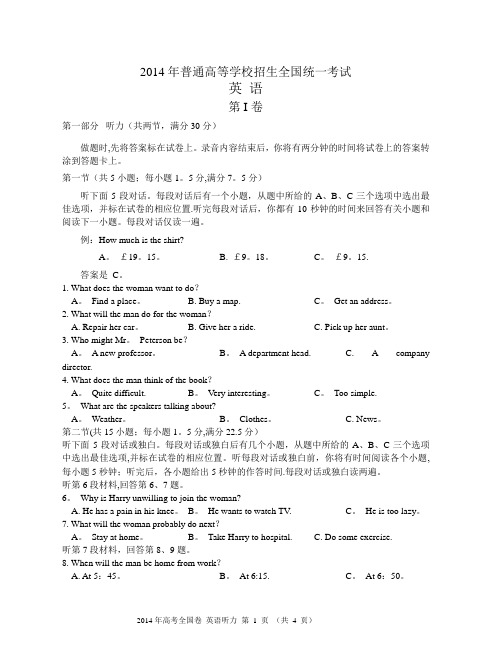
2014年普通高等学校招生全国统一考试英语第I卷第一部分听力(共两节,满分30分)做题时,先将答案标在试卷上。
录音内容结束后,你将有两分钟的时间将试卷上的答案转涂到答题卡上。
第一节(共5小题;每小题1。
5分,满分7。
5分)听下面5段对话。
每段对话后有一个小题,从题中所给的A、B、C三个选项中选出最佳选项,并标在试卷的相应位置.听完每段对话后,你都有10秒钟的时间来回答有关小题和阅读下一小题。
每段对话仅读一遍。
例:How much is the shirt?A。
£19。
15。
B. £9。
18。
C。
£9。
15.答案是C。
1. What does the woman want to do?A。
Find a place。
B. Buy a map. C。
Get an address。
2. What will the man do for the woman?A. Repair her car。
B. Give her a ride.C. Pick up her aunt。
3. Who might Mr。
Peterson be?A。
A new professor。
B。
A department head. C. A company director.4. What does the man think of the book?A。
Quite difficult. B。
Very interesting。
C。
Too simple.5。
What are the speakers talking about?A。
Weather。
B。
Clothes。
C. News。
第二节(共15小题;每小题1。
5分,满分22.5分)听下面5段对话或独白。
每段对话或独白后有几个小题,从题中所给的A、B、C三个选项中选出最佳选项,并标在试卷的相应位置。
听每段对话或独白前,你将有时间阅读各个小题,每小题5秒钟;听完后,各小题给出5秒钟的作答时间.每段对话或独白读两遍。
2014年上海市中考英语试题(含听力)
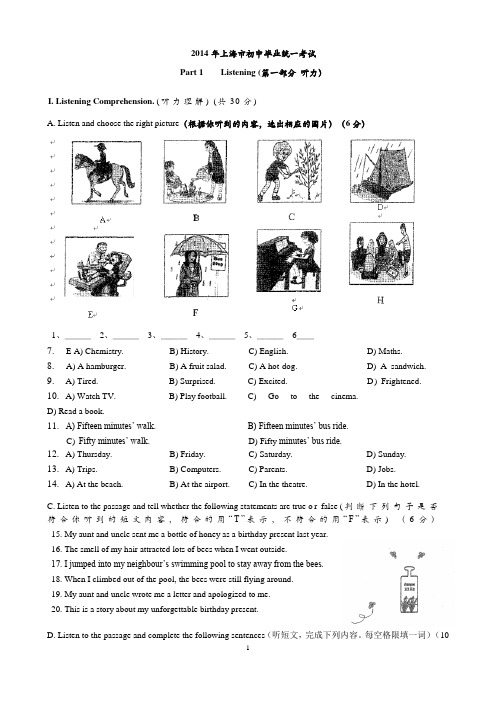
D) Maths. D) A sandwich. D) Frightened. 2014年上海市初中毕业统一考试Part 1 Listening (第一部分 听力)I. Listening Comprehension. (听力理解) (共30分)A. Listen and choose the right picture (根据你听到的内容,选出相应的图片)(6分)1、___2、___3、___4、___5、___ 6__7. E A) Chemistry.B) History. C) English. 8. A) A hamburger.B) A fruit salad. C) A hot-dog. 9. A) Tired.B) Surprised. C) Excited. 10. A) Watch TV.B) Play football. C) Go to the cinema.D) Read a book. 11. A) Fifteen minutes’ walk.B) Fifteen minutes’ bus ride. C) Fifty minutes’ walk.D) Fifty minutes’ bus ride. 12. A) Thursday. B) Friday.C) Saturday. D) Sunday. 13. A) Trips. B) Computers.C) Parents. D) Jobs. 14. A) At the beach.B) At the airport. C) In the theatre. D) In the hotel.C. Listen to the passage and tell whether the following statements are true o r false (判断下列句子是否符合你听到的短文内容,符合的用“T ”表示,不符合的用“F ”表示) (6分)15. My aunt and uncle sent me a bottle of honey as a birthday present last year.16. The smell of my hair attracted lots of bees when I went outside.17. I jumped into my neighbour’s swimming pool to stay away from the bees.18. When I climbed out of the pool, the bees were still flying around.19. My aunt and uncle wrote me a letter and apologized to me.20. This is a story about my unforgettable birthday present.D. Listen to the passage and complete the following sentences (听短文,完成下列内容。
2014上海听力

Section A1. W: What can I do for you, sir?M: I want to report a theft. My briefcase was stolen.Q: Who is most probably the woman?2. W: You will take care, won’t you? The roads are very very icy.M: I will drive very very slowly. I promise.Q: How does the woman feel?3. M: Moring, I have a reservation. The name is Blake Smith.W: OK. We’ve got a nice car already. I need to see your driver’s license and your credit card.Q: Where does the conversation most probably take place?4. W: CCTV is reporting an enormous flooding now! Look at those people on the roof.M: I hope it doesn’t cause to much damage.Q: What are those two speakers talking about?5. W: Would you please help me clean the back yard today?M: Sure. I am picking Jane up from the railway station at 3, but I will help you as soon as I get back.Q: What will the man do first?6. W: The vase is amazing! But it’s a bit more than I want to spend.M: Maybe you can get a better price at count time to ask. (3:17)Q: What does the man suggest the women do?7. W: My computer’s broken down. Could I use yours to write a chemistry paper?M: Sorry, I am in the middle of revising my report. You know the computer lab is still open.Q: What does the man imply the women should do?8. W: I’ve declined their of fer to exhibiting some of my paintings in this gallery.M: Are you kidding? Any art student I know would die to have an exhibition here.Q: How does the man feel on hearing the woman’s decision?9. M: You are not planning to transfer to a different university next year, are you?W: If I were, you’d be the first one to know.Q: What does the woman imply?10. M: Did you read the editorial in the newspaper about Mirs Speech? (4:47)M: Sure, I did. But I think they twisted the meaning of what he said.Q: What does the man say of the editorial?Section BQuestions 11 through 13 are based on the following passage.About 70 miles northeast of Vancouver is one of Canada’s most beautiful tourist regions. Visitors come to enjoy fishing, skiing or the splendid mountain scenery. Over 20 years ago, Christi bone, a successful businesswoman came here and founded Paradise Ridge, a cabin park. She said I wanted to live somewhere everybody knows everybody else and all your problems are shared. Paradise Ridge is now home to 25 families. Each family owns their own small cabin. But they share the ownership of the park and the common facilities. This is a really living community and residents aren’t allowed to use their cabin as a holiday home. The heart of the Paradise Ridge c ommunity is a large house. Shared meals take place 3 times a week and once a month there’s a meeting when important decisions are made. Families can sell their homes if they want to leave, but the whole community must vote on new families before they are a llowed to join. ‘Keeping the communitytogether is hard work’ says Christi, ‘Everybody has to take responsibility for the day to day running of the community, but it seems there is no shortage of the families who want to join. There are 75 on the waiting list.11. How many families are living in the Paradise Ridge now?12. What is special of Paradise Ridge?13. What is the passage mainly about?Questions 14 through 16 are based on the following news.It’s 3 pm. Time for news from the World of Medicine. Does sitting make you sad? Australian researchers found that middle-aged women who sat for over 7 hours a day were 47 percent more likely to show sense of depression than those who sat for 4 hours or fewer. Those who engaged in no physical activity were 26 percent more likely to have symptoms of depression 3 years later than those who exercise regularly. Sitting for long periods has also been linked to heart disease.How can you detect a liar through a texted message? Watch for a delayed response. When college students were asked to tell a lie during an interview with a computer, they took 10 percent longer on average to send a message and they did more editing than usual.Can marriage beat cancer? Married people were 20 percent less likely to die from the disease than those who were unmarried, according to a Harvard study of more than 730,000 people. They were also more likely to get the disease detected at an earlier stage and receive proper treatment. A husband or wife can urge you to seek medical help and support you during tough chemical therapy, radiation and other treatments.14. Who would most to suffer from depression according to Australian researchers?15. How did students behave when they told a lie during the interview with a computer?16 What is the third piece of news mainly about?Section CBlanks 17 through 20 are based on the following conversation.W: Excuse me. I am Linda Li from the airport research division. May I ask you a few questions about the environment and the facilities there?M: OK.W: Are you on a business trip?M: Yes, I am heading off for a conference in London.W: What do you like most about the airport environment?M: Well, I really appreciate the daylight.W: Daylight?M: Yes, the windows here make it seems if you are outside. Another thing I like is the moving walkways. You don’t have to walk for miles to the boarding gate.W: I see. Anything you don’t like?M: The shops are often overcrowded. There is no enough space to move around comfortably, and also I suppose the trollies are too small.W: Well, thanks for your time.Blanks 21 through 24 are based on the following passage.W: Professor King, what exactly is critical thinking?M: Well, when you read critically, you should assess the writer’s ideas and think about the applications and the conclusions of what the writer is saying.W: Can you give me an example?M: When you read an academic text, first you should identify the argument and work out the writer’s main line of reasoning.W: OK. What then?M: Try to analyze and criticize the argument.W: I see. That’s why you often ask whether the argument is presented in a logical way.M: Right! Then assess the evidence the writer gives you. That may be in the form of figures, survey results, examples etc.W: How about th e writer’s conclusions?M: Ask yourself if they are supported by the evidence.W: Got it, thanks Professor King.M: Remember the key to critical thinking is to read actively and keep asking yourself questions rather than just expecting.。
2014年全国高考英语听力卷试题、答案 听力原文
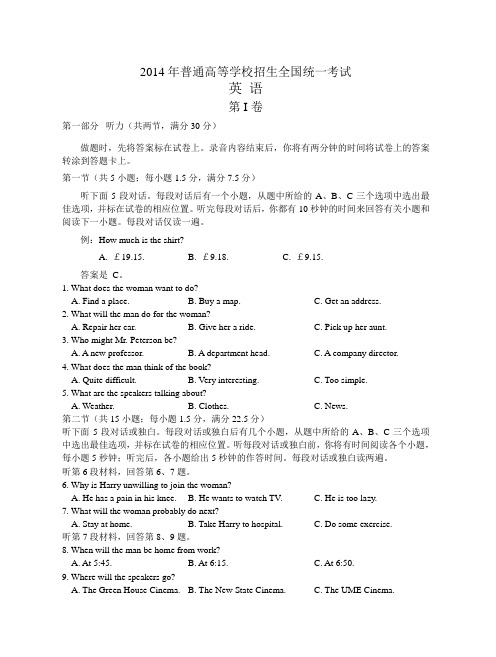
2014年普通高等学校招生全国统一考试英语第I卷第一部分听力(共两节,满分30分)做题时,先将答案标在试卷上。
录音内容结束后,你将有两分钟的时间将试卷上的答案转涂到答题卡上。
第一节(共5小题;每小题1.5分,满分7.5分)听下面5段对话。
每段对话后有一个小题,从题中所给的A、B、C三个选项中选出最佳选项,并标在试卷的相应位置。
听完每段对话后,你都有10秒钟的时间来回答有关小题和阅读下一小题。
每段对话仅读一遍。
例:How much is the shirt?A. £19.15.B. £9.18.C. £9.15.答案是C。
1. What does the woman want to do?A. Find a place.B. Buy a map.C. Get an address.2. What will the man do for the woman?A. Repair her car.B. Give her a ride.C. Pick up her aunt.3. Who might Mr. Peterson be?A. A new professor.B. A department head.C. A company director.4. What does the man think of the book?A. Quite difficult.B. Very interesting.C. Too simple.5. What are the speakers talking about?A. Weather.B. Clothes.C. News.第二节(共15小题;每小题1.5分,满分22.5分)听下面5段对话或独白。
每段对话或独白后有几个小题,从题中所给的A、B、C三个选项中选出最佳选项,并标在试卷的相应位置。
听每段对话或独白前,你将有时间阅读各个小题,每小题5秒钟;听完后,各小题给出5秒钟的作答时间。
2014年高考英语听力全国卷

2014年普通高等学校招生全国统一考试(全国卷)第一节(共5小题;每小题1.5分,满分7.5分)听下面5段对话。
每段对话后有一个小题,从题中所给的A、B、C三个选项中选出最佳选项,并标在试卷的相应位置。
听完每段对话后,你都有10秒钟的时间来回答有关小题和阅读下一小题。
每段对话仅读一遍。
1. What does the woman want to do?A. Find a place.B. Buy a map.C. Get an address.2. What will the man do for the woman?A. Repair her car.B. Give her a ride.C. Pick up her aunt.3. Who might Mr. Peterson be?A. A new professor.B. A department head.C. A company director.4. What does the man think of the book?A. Quite difficult.B. Very interesting.C. Too simple.5. What are the speakers talking about?A. Weather.B. Clothes.C. News.第二节(共15小题;每小题1.5分,满分22.5分)听下面5段对话或独白。
每段对话或独白后有几个小题,从题中所给的A、B、C三个选项中选出最佳选项,并标在试卷的相应位置。
听每段对话或独白前,你将有时间阅读各个小题,每小题5秒钟;听完后,各小题给出5秒钟的作答时间。
每段对话或独白读两遍。
听第6段材料,回答第6、7题。
6. Why is Harry unwilling to join the woman?A. He has a pain in his knee.B. He wants to watch TV.C. He is too lazy.7. What will the woman probably do next?A. Stay at home.B. Take Harry to hospital.C. Do some exercise.听第7段材料,回答第8、9题。
2014年高考真题英语听力试题、原文及答案(上海卷)
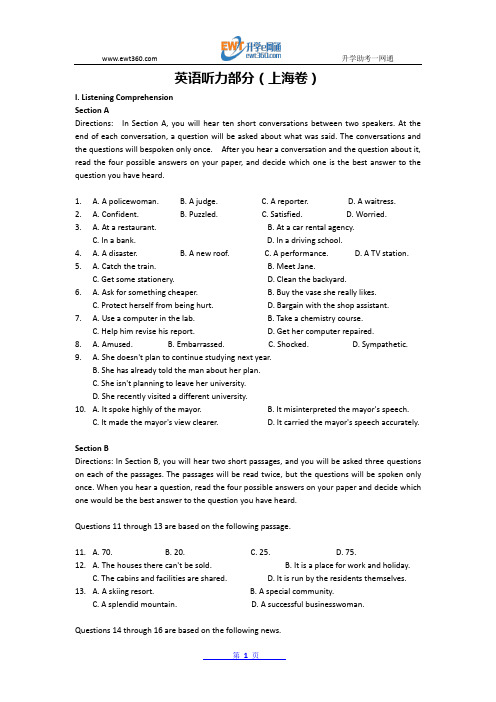
英语听力部分(上海卷)I. Listening ComprehensionSection ADirections: In Section A, you will hear ten short conversations between two speakers. At the end of each conversation, a question will be asked about what was said. The conversations and the questions will bespoken only once. After you hear a conversation and the question about it, read the four possible answers on your paper, and decide which one is the best answer to the question you have heard.1. A. A policewoman. B. A judge. C. A reporter. D. A waitress.2. A. Confident. B. Puzzled. C. Satisfied. D. Worried.3. A. At a restaurant. B. At a car rental agency.C. In a bank.D. In a driving school.4. A. A disaster. B. A new roof. C. A performance. D. A TV station.5. A. Catch the train. B. Meet Jane.C. Get some stationery.D. Clean the backyard.6. A. Ask for something cheaper. B. Buy the vase she really likes.C. Protect herself from being hurt.D. Bargain with the shop assistant.7. A. Use a computer in the lab. B. Take a chemistry course.C. Help him revise his report.D. Get her computer repaired.8. A. Amused. B. Embarrassed. C. Shocked. D. Sympathetic.9. A. She doesn't plan to continue studying next year.B. She has already told the man about her plan.C. She isn't planning to leave her university.D. She recently visited a different university.10. A. It spoke highly of the mayor. B. It misinterpreted the mayor's speech.C. It made the mayor's view clearer.D. It carried the mayor's speech accurately.Section BDirections: In Section B, you will hear two short passages, and you will be asked three questions on each of the passages. The passages will be read twice, but the questions will be spoken only once. When you hear a question, read the four possible answers on your paper and decide which one would be the best answer to the question you have heard.Questions 11 through 13 are based on the following passage.11. A. 70. B. 20. C. 25. D. 75.12. A. The houses there can't be sold. B. It is a place for work and holiday.C. The cabins and facilities are shared.D. It is run by the residents themselves.13. A. A skiing resort. B. A special community.C. A splendid mountain.D. A successful businesswoman.Questions 14 through 16 are based on the following news.14. A. Those who often sent text messages. B. Those who suffered from heart disease.C. Those who did no physical exercise.D. Those who were unmarried.15. A. They responded more slowly than usual. B. They sent more messages.C. They typed 10 percent faster on average.D. They edited more passages.16. A. Why chemical therapy works.B. Why marriage helps fight cancer.C. How unmarried people survive cancer.D. How cancer is detected after marriage.Section CDirections: In Section C, you will hear two longer conversations. The conversations will be read twice. After you hear each conversation, you are required to fill in the numbered blanks with the information you have heard. Write your answers on your answer sheet.Blanks 17 through 20 are based on the following conversation.听力部分答案1. A 2.D 3.B 4.A 5.B6.D7.A8.C9.C 10.B11.C 12.D 13.B 14.C 15.A 16.B17. conference18. daylight19. moving20. overcrowded21. implications and conclusions22. reasoning23. Figures24. keep questioning附:听力原文材料见下一页(图片形式)。
- 1、下载文档前请自行甄别文档内容的完整性,平台不提供额外的编辑、内容补充、找答案等附加服务。
- 2、"仅部分预览"的文档,不可在线预览部分如存在完整性等问题,可反馈申请退款(可完整预览的文档不适用该条件!)。
- 3、如文档侵犯您的权益,请联系客服反馈,我们会尽快为您处理(人工客服工作时间:9:00-18:30)。
2014年普通高等学校招生全国统一考试(上海卷)Section A Directions:In Section A, you will hear ten shortconversations betweentwo speakers. At theend of each conversation, a question will beasked about what was said. The conversationsand the questions will besp oken only once. After you hear a conversation and thequestion about it, read the four possible answers on your paper, and decide which on eis the best answer to the question you have heard. 1.A. A policewoman. B. A judge. C. A reporter. D.A waitress. 2.A. Confident. B. Puzzled. C. Satisfied. D. Worried.3.A. At a restaurant. B. At a car rental agency. C. In a bank. D. In a driving school.4.A. A disaster. B. A new roof. C. A performance. D.A TV station. 5.A. Catch the train. B. Meet Jane. C. Get some stationery. D. Clean the backyard. 6.A. Ask for something cheaper.B. Buy the vase she really likes.C. Protect herself from being hurt.D. Bargain with the shop assistant. 7.A. Use a computer in the lab. B. Take a chemistry course. C. Help him revise his report. D. Get her computer repaired. 8.A. Amused. B. Embarrassed. C. Shocked. D. Sympathetic. 9.A. She doesn't plan to continue studying next year.B. She has already told the man about her plan.C. She isn't planning to leave her university.D. She recently visited a different university. 10. A. It spoke highly of the mayor. B. It misinterpreted the mayor's speech. C. It made the mayor's view clearer. D. Itcarried the mayor's speech accurat ely. Section B Directions: In Section B, you will hear two short passages, and you will be asked threequestions on each of the passages. The passages will be read twice, but the questionswill be spoken only once. When you hear a question, read the four possible answerson your paper and dec ide which one would be the best answer to the question youhave heard.Questions 11 through 13 are based on the following passage. 11. A. 70. B. 20. C. 25. D. 75. 12. A. The houses there can't be sold. B. It is a place for work and holiday. C. The cabins and facilities are shared. D. It is run by the residents themselve s. 13. A.A skiing resort. B. A special community. C. A splendid mountain. D.A successful businesswoman. Questions 14 through 16 are based on the following news. 14. A. Those who often sent text messages.B. Those who suffered from heart disease.C. Those who did no physical exercise.D. Those who were unmarried. 15. A. They responded more slowly than usual. B. They sent more messages. C. They typed 10 percent faster on average. D. They edited more passages. 16. A. Why chemical therapy works. B. Why marriage helps fight cancer. C. How unmarried people survive cancer. D. How cancer is detected after marriage. Section C Directions:In Section C, you will hear two longer conversations.The c onversations willbe read twice.After you hear each conversation,you are required to fill in thenumbered blanks with the information you h ave heard. Write your answers on youranswer sheet. Blanks 17 through 20 are based on the following plete the form.Write ONE WORD for each answer. Blanks 21 through 24 are based on the following plete the form. Write NO MORE THAN THREE WORDS for each answer.Section A 1. W: What can I do for you, sir? M: I want to report a theft. My briefcase was stolen. Q: Who is most probably the woman? 2. W: You will take care, won’t you? The roads arevery very icy. M: I will drive very very slowly. I promise. Q: How does the woman feel? 3. M: Moring, I have a reservation. The name is Blake Smith. W: OK. We’ve got a nice car already. I need to see your driver’s license and y our credit card. Q: Where does the conversation most probably take place? 4. W: CCTV is reporting an enormous flooding now! Look at those people on t he roof. M: I hope it doesn’t cause to much damage. Q: What are those two speakers talking about? 5. W: Would you please help me clean the back yard today? M: Sure. I am picking Jane up from the railway station at 3, but I will help yo u as soon as I getback. Q: What will the man do first? 6. W: The vase is amazing! But it’s a bit more than I want to spend. M: Maybe you can get a better priceat count time to ask. (3:17) Q: What does the man suggest the women do? 7. W: My computer’s broken down. Could I use yours to write a chemistry pa per? M: Sorry, I am in the middle of revising my report. You know the computer la b is still open. Q: What does the man imply the women should do? 8. W: I’ve declined their offer to exhibiting some of my paintings in this galler y. M: Are you kidding? Any art student I know would die to have an exhibition h ere. Q: How does the man feel on hearing the woman’s decision? 9. M: You are not planning to transfer to a different university next year, are you? W: If I were, you’d be the first one to know. Q: What does the woman imply? 10. M: Did you read the editorial in the newspaper about Mirs Speech? (4:47) M: Sure, I did. But I think they twisted the meaning of what he said. Q: What does the man say of the editorial? Section B Questions 11 through 13 are based on the following passage. About 70 miles northeast of Vancouver is one of Canada’s most beautiful tourist regions. Visitors come to enjoy fishing, skiing or the splendid mountain scenery. Over 20 years ago, Christi bone, a successful businesswoman came here and founded Paradise Ridge, a cabin park. She said I wanted to live somewhere everybody knows everybody else and all your problems areshared. ParadiseRidge is now home to 25 families. Each family owns their own small cabin. Butthey share the ownership of the park and the common facilities. This is a really livingcommunity and residents aren’t allowed to use their cabin as a holiday home. The heart of theParadise Ridge community is a large house. Shared meals take place 3 times a week and once amonth there’s a meeting when important decisions are made. Families can sell their homes ifthey want to leave, but the whole community must vote on new families before they areallowed to join. ‘Keeping the community together is hard work’ says Christi, ‘Everybody has totake responsibility for the day to day running of the community, but it seems there is noshortage of the families who want to join. There are 75 on the waiting list. 11. How many families are living in the Paradise Ridge now? 12. What is special of Paradise Ridge? 13. What is the passage mainly about? Questions 14 through 16 are based on the following news. It’s 3 pm. Time for news from the World of Medicine. Does sitting make you sad? Australianresearchers found that middle-aged women who sat for over 7 hours a day were 47 percentmore likely to show sense of depression than those who sat for 4 hours or fewer. Those whoengaged in no physical activity were 26 percent more likely to have symptoms of depression 3 years later than those whoexercise regularly. Sitting for long periods has also been linked toheart disease. How can you detect a liar through a texted message? Watch for a delayed response. Whencollege students were asked to tell a lie during an interview with a computer, they took 10 percent longer on average to send a message and they did more editing than usual. Can marriage beat cancer? Married people were 20 percent less likely to die from the diseasethan those who were unmarried, according to a Harvard study of more than 730,000 people. They were also more likely to get the disease detected at an earlier stage and receive propertreatment. A husband or wife can urge you to seek medical help and support you during toughchemical therapy, radiation and other treatments.14. Who would most to suffer from depression according to Australian researchers? 15. How did students behave when they told a lie during the interview with a computer? 16 What is the third piece of news mainly about? Section C Blanks 17 through 20 are based on the following conversation. W: Excuse me. I am Linda Li from the airport research division. May I ask you a few questionsabout the environment and the facilities there? M: OK. W: Are you on a business trip? M: Yes, I am heading off for a conference in London. W: What do you like most about the airport environment? M:Well, I really appreciate the daylight. W: Daylight? M: Yes, the windows here make it seems if you are outside. Another thing I like is the movingwalkways. You don’t have to walk for miles to the boarding gate. W: I see. Anything you don’t like? M: The shops are often overcrowded. There is no enough space to move around comfortably, and also I suppose the trollies are too small. W: Well, thanks for your time. Blanks 21 through 24 are based on the following passage. W: Professor King, what exactly is critical thinking? M: Well, when you read critically, you should assess the writer’s ideas and think about theapplications and the conclusions of what the writer is saying. W: Can you give me an example? M: When you read an academic text, first you should identi fy the argument and work out thewriter’s main line of reasoning. W: OK. What then? M: Try to analyze and criticize the argument. W: I see. That’s why you often ask whether the argument is presented in a logical way. M: Right! Then assess the evidence the writer gives you. That may be in the form of figures, survey results, examples etc. W: How about the writer’s conclusions? M: Ask yourself if they are supported by the evidence. W: Got it, thanks Professor King. M: Remember the key to critical thinking is to read actively and keep asking yourself questionsrather than just expecting.。
